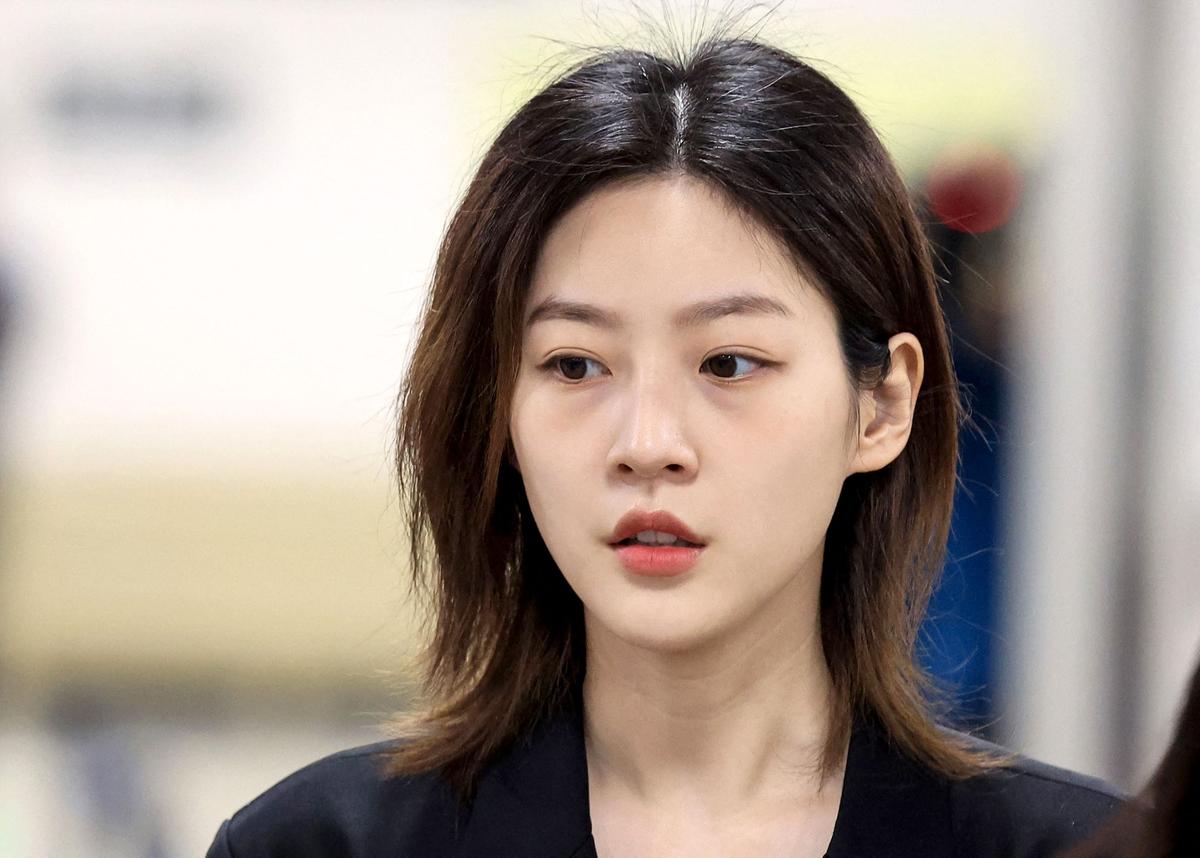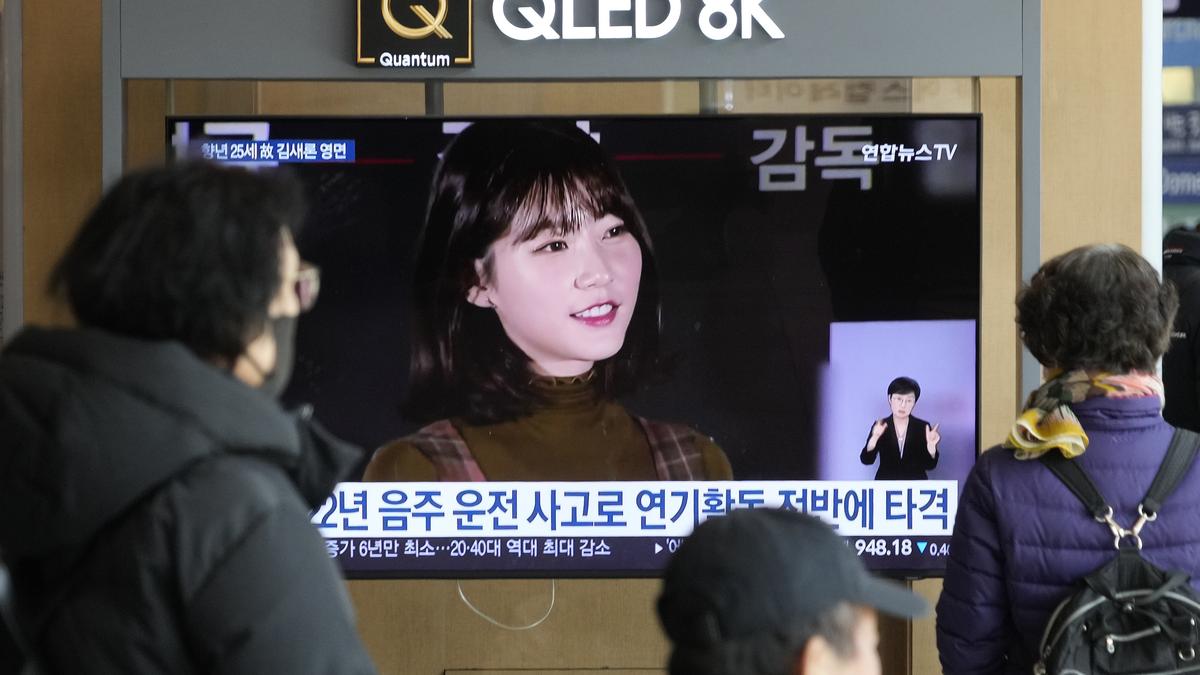In the about 1,000 days between her drunken-driving crash in May 2022 and her death, South Korean mainstream news organizations published at least around 2,000 stories on film actor Kim Sae-ron. A quick search in the country’s press database yields a wave of sensational headlines that illustrate how the local media often cover a celebrity’s fall from grace. Previously one of the brightest young stars in South Korean cinema, Kim was condemned and ridiculed for driving drunk; for talking about her financial struggles after losing roles; for taking a job at a coffee shop; for attempting a comeback in theater; for going out with friends instead of “showing remorse”; and for being seen smiling on set while shooting an indie movie.
After the 24-year-old actor was found dead at her home Sunday, the headlines predictably swung to calling for changes to the way celebrities are treated in the public arena.
Kim’s death, which police consider a suicide, adds to a growing list of high-profile celebrity deaths in the country, which some experts attribute to the enormous pressure celebrities face under the gaze of a relentlessly unforgiving media that seizes on every misstep.
Here’s a look at the intense pressure faced by South Korean celebrities who fall from grace.
South Korea is notoriously harsh on its celebrities, particularly women.
Kim rose to stardom as a child actor with the 2010 hit crime thriller The Man from Nowhere and gained acclaim for her performances in films and TV dramas for years. However, that changed on May 18, 2022, when she crashed her vehicle into a tree and an electrical transformer while driving drunk in southern Seoul. She posted a handwritten apology on Instagram and reportedly compensated around 60 businesses that temporarily lost power due to the crash. Despite this, negative media coverage persisted, and she struggled to find acting work.

South Korean actor Kim Sae-ron upon her arrival at the Seoul Central District Court in Seoul, to attend her trial over an alleged drunk driving case.
When a Seoul court fined her 200 million won ($139,000) in April 2023, Kim expressed her fears about the media, telling reporters that many articles about her private life were untrue.
“I’m too scared to say anything about them,” she said.
Following her drunken-driving incident, celebrity gossip channels on YouTube began posting negative videos about her personal life, alleging—without evidence—that she exaggerated her financial struggles by working at coffee shops. They also argued that her social media posts showing her socializing indicated a lack of remorse.
Other entertainers, especially women, have faced similar difficulties resuming their careers after legal troubles, including DUI and substance abuse cases. Experts note that many are reluctant to seek treatment for mental health conditions like depression, fearing further negative publicity.
Kwon Young-chan, a comedian-turned-scholar who leads a group supporting celebrities with mental health issues, said stars often feel helpless when their carefully cultivated public image is tarnished by negative coverage. Kwon, who stayed with Kim’s relatives during her traditional three-day funeral process, said her family is considering legal action against a YouTube creator with hundreds of thousands of subscribers for what they describe as baseless attacks on Kim’s private life.

Peter Jongho Na, a professor of psychiatry at the Yale School of Medicine, lamented on Facebook that South Korean society had become a giant version of Squid Game, the brutal Netflix survival drama, “abandoning people who make mistakes or fall behind, acting as though nothing happened.”
The National Police Agency found no signs of foul play at Kim’s home, and she left no note. However, her death has reignited discussions about how news organizations cover celebrities’ private lives and whether waves of online criticism are harming their mental health. Similar conversations arose after the 2008 death of movie star Choi Jin-sil; the 2013 death of her former baseball player husband, Cho Sung-min; the 2019 deaths of K-Pop singers Sulli and Goo Hara; and the 2023 death of Parasite actor Lee Sun-kyun.
Hyun-jae Yu, a communications professor at Seoul’s Sogang University, noted that sensational but unverified claims from social media are often recycled and amplified by traditional media outlets as they compete for audience attention. Struggling with declining readership, he said, news organizations increasingly cover YouTube drama as an easy way to drive traffic, often forgoing fact-checking.
After the 2019 deaths of Sulli and Goo Hara—widely attributed to cyberbullying and media harassment—lawmakers proposed measures to curb online abuse. These included expanding real-name requirements and strengthening website regulations to combat hate speech and misinformation. However, none of these proposals passed.
South Korean management agencies have become more proactive in protecting their artists from online harassment. Hybe, which manages several K-Pop groups, including BTS, regularly updates the public on lawsuits it files against social media commentators it deems malicious.

Still, Yu emphasized that mainstream media must strengthen self-regulation and limit reliance on YouTube content as a news source. He suggested that government authorities could also hold platforms like YouTube accountable, requiring them to remove harmful videos and prevent monetization of problematic content.
In a statement to The Associated Press, YouTube said it enforces guidelines against threats, harassment, and hate speech, adding that channels repeatedly violating its policies could be demonetized or terminated.
Heo Chanhaeng, an executive director at the Center for Media Responsibility and Human Rights, proposed that news organizations and websites consider disabling comment sections on entertainment stories altogether.
“Her private life was indiscriminately reported beyond what was necessary,” Heo said. “That’s not a legitimate matter of public interest.”
Published – February 21, 2025 01:09 pm IST

